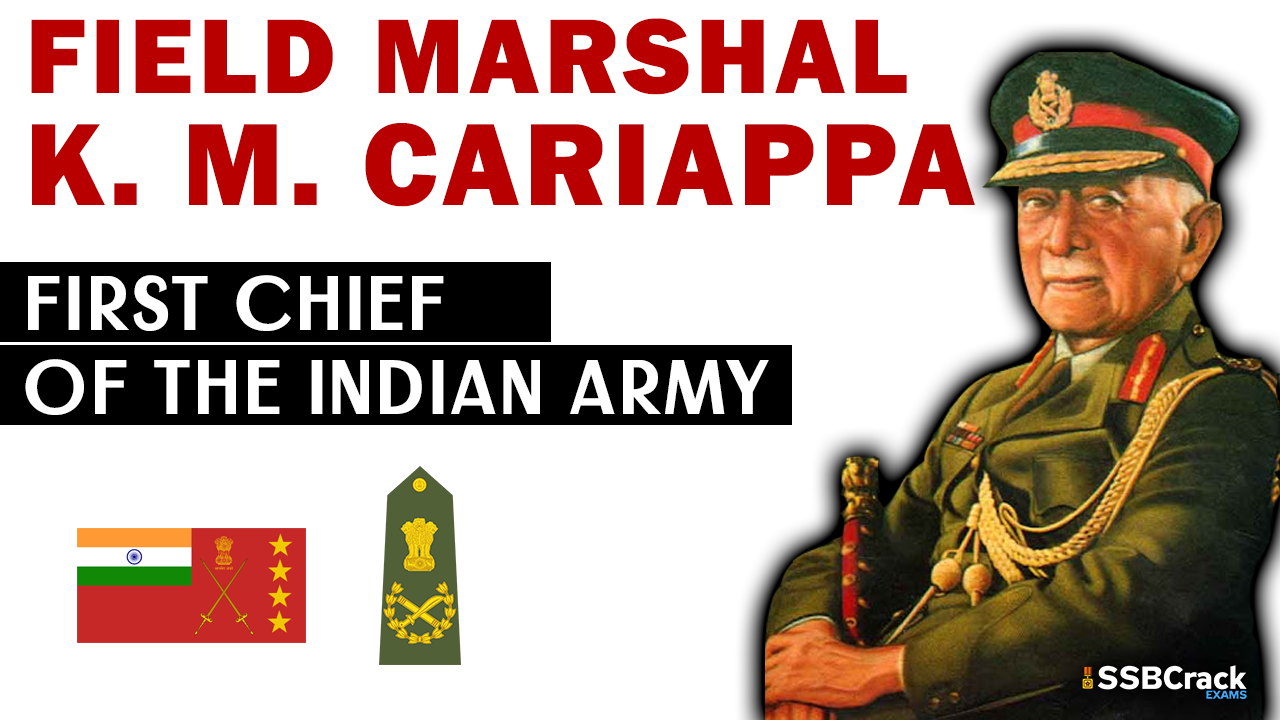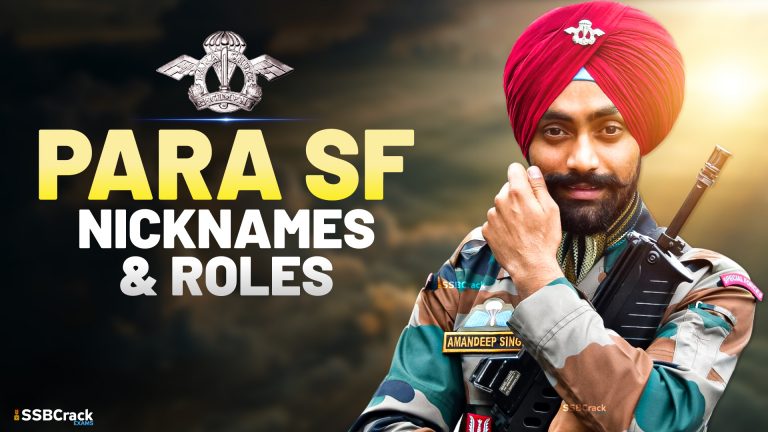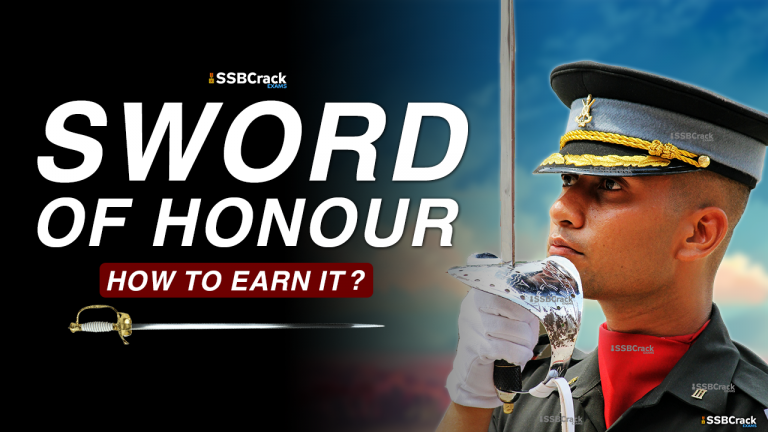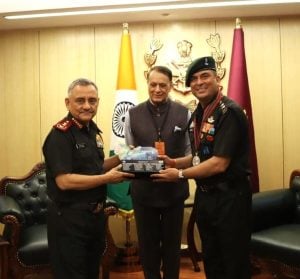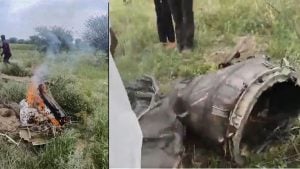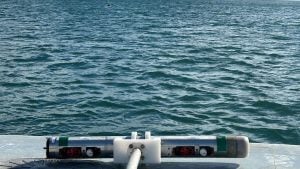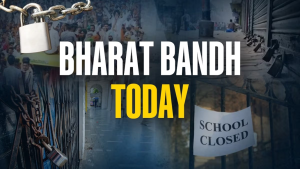WHO IS HE?
- Field Marshal Kodandera Madappa Cariappa, OBE was the first Indian Commander-in-Chief (C-in-C) of the Indian Army and was appointed this post in the year of 1949.
- Led Indian forces on the Western Front during the Indo-Pakistani War of 1947.
- He is one of only two Indian Army officers to hold the Five-star rank of Field Marshal; the other being Field Marshal Sam Manekshaw.
EARLY DETAILS
- Birth: 29 December 1898 at Shanivarsanthe, Kodagu (Coorg Province), British India.
- Death: 15 May 1993 (aged 94) at Bengaluru, Karnataka, India.
- School education at Central High School at Madikeri in 1917. Higher education at Presidency College, Chennai.
- His father, Madappa, worked with the revenue department. Cariappa was the second child in a family of four sons and two daughters.
- Of the 70 applicants who applied for the British Army, Cariappa was one of 42 who were finally granted admission into the Daly Cadet College, Indore. He scored well in all the aspects of his training and graduated seventh in his class.
- Though officers were generally given staff appointments after completion of the course, Cariappa was not given his staff appointment until two years later. Until then, he rendered regimental service with his parent unit on the North-West Frontier.
MILITARY CAREER DETAILS
- 1 December 1919 – Graduated and granted a temporary commission.
- A permanent commission was granted on 9 September 1922, with effect from 17 July 1920.
- In 1925, Cariappa went on a world tour to Europe as well as the United States, Japan, and China. This proved to be educational to him.
- Cariappa was appointed as the deputy assistant quarter master general (DAQMG) at HQ Peshawar District in 1931.
- He undertook coaching at Royal United Services Institute in 1932, Small Arms School (SAS) and the Royal School of Artillery (RSA).
- In March 1936, he was appointed as staff captain of the Deccan Area.
- In 1938, Cariappa was promoted to major and was appointed the deputy assistant adjutant and quarter master general (DAA & QMG).
1939 SKEEN COMMITTEE
- This was set up to examine the options for the “Indianization” of the Indian Army’s officer ranks.
- The committee held several discussions with Cariappa as he was one of the most senior officers with 19 years of service in distinguished war zones.
- Cariappa expressed his displeasure at the treatment of Indian officers in the Army regarding the pensions, appointments, promotions, benefits and allowances.
WORLD WAR II
- He served in Iraq, Iran and Syria in 1941–1942.
- He served in Burma in 1943–1944.
- Back in India in March 1942, he was posted as second-in-command of the newly raised 7th Rajput Machine Gun Battalion at Fatehgarh.
- On 15 April 1942, he was promoted to acting lieutenant colonel and was appointed commanding officer of the same battalion – first Indian to command a battalion in Indian Army.
LATER POSTINGS
- On 1 April 1943, he was appointed as the assistant quarter master general (AQMG) in the headquarters of Eastern Command.
- On 1 May 1945, Cariappa was promoted to the rank of Brigadier and was given a Brigade.
- In November, Cariappa was made the commander of the Bannu Frontier Brigade in Waziristan. It was during this time that Colonel Ayub Khan – later Field Marshal and President of Pakistan – served under him.
IMPRESSIVE MOMENTS
- When Head of the Interim Government, Jawaharlal Nehru visited Bannu. He found it extremely peaceful and settled. Nehru was impressed by Cariappa’s way of dealing with the tribes.
- Cariappa was also widely acclaimed for his treatment of the Indian National Army’s (INA) prisoners.
- In 1947, Cariappa was the first of two Indians selected to undergo training at the Imperial Defence College, at Camberly, UK.
DURING INDIAN INDEPENDENCE
- On 30 July 1947, Cariappa was promoted to the rank of major-general, becoming one of the first Indians to be promoted to this rank in a combat arm of the Indian Army, along with brigadiers Muhammad Akbar Khan and Maharaj Shri Rajendrasinhji Jadeja.
- Post-Independence, Cariappa was appointed as deputy chief of the general staff.
KASHMIR OPERATIONS
- Cariappa was called back to the capital and appointed as the GOC-in-C Delhi and East Punjab Command in Jan 1948.
- He immediately renamed it the Western Command and moved its headquarters (HQ) to Jammu.
- A corps HQ under Lt Gen S.M. Shrinagesh was raised at Udhampur as per Cariappa’s commands.
- He appointed Lt Gen Kodandera Subayya Thimayya as the GOC Jammu and Kashmir Force.
- On 6 July 1948, the Army HQ issued strict instructions against conducting any major operations without its permission. Cariappa protested against this, stating that this policy would threaten Leh, Kargil, and ultimately the Kashmir Valley, which would put the country’s security at stake.
- Though Cariappa asked for two brigades to continue offensive strikes, he was provided only one and permitted to advance to Kargil. He disobeyed orders and launched strikes in the Ladakh area allowing India to assert control over the region. Cariappa continued several operations and offensive strikes against the Pakistanis, which involved high risk. Failure of any of them might have threatened the Indian forces. He was subsequently appointed to the supreme post of commander-in-chief.
AS A COMMANDER-IN-CHIEF
- The day Cariappa took over the reins of the Indian Army, 15 January 1949, was marked as official Army Day and celebrated annually.
- He was instrumental in the formation of the Territorial Army in 1949 and extended support to NCC.
- Refused to induct former Indian National Army’s personal into Indian Army but took their phrase “Jai Hind”.
- Refused caste-based reservations/selections in Army.
PERSONAL LIFE
- Cariappa was married in March 1937, in Secunderabad, to Muthu Machia, a forest officer’s daughter.
- In 1948, his wife died in an accident.
- Their son, K.C. Cariappa, was born on 4 January 1938, and daughter Nalini on 23 February 1948. Their son, called “Nanda”, joined the Indian Air Force and rose to the rank of Air Marshal.
POST RETIREMENT
- Served as the Indian High Commissioner to Australia and New Zealand until 1956.
- Founded the Indian Ex-Servicemen’s League (IESL) in 1964.
- Instrumental in setting up the Directorate of Resettlement (later Directorate General Resettlement).
- Awarded the “Legion of Merit” in the degree of Chief Commander by the American President Harry S. Truman.
- The Government of India conferred the rank of Field Marshal on Cariappa on 28 April 1986.
REMEMBERING HIS LAST TIMES
- Cariappa’s health began to deteriorate in 1991; he suffered from arthritis and heart problems.
- He died in his sleep on 15 May 1993, at the Bangalore Command Hospital where he had been receiving treatment for a few years.
- His mortal remains were cremated in Madikeri two days later. The cremation was attended by the three service chiefs along with Field Marshal Sam Manekshaw.
Also Read:
- Colonel RS Jamwal Awarded MacGregor Memorial Medal for 2024 by Chief of Defence Staff General Anil Chauhan
- Indian Air Force Jaguar Trainer Aircraft Crashes in Rajasthan, Both Pilots Killed
- Raytheon’s Barracuda Successfully Demonstrates Autonomous Underwater Mine Neutralization Capability
- Bharat Bandh : 25 Crore Workers To Participate In Strike
- P K Mishra reviews indigenous defence projects during visit to HAL Bengaluru


